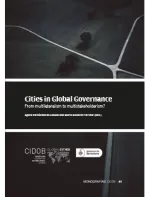Towards an ecology of knowledges for global politics: civil society and local government alliances in Habitat III Eva Garcia-Chueca and Lorena Zárate

The shift from traditional multilateralism to increased multi-stakeholder governance is gaining momentum in international relations. In this scenario it is necessary to ask what the implications and limits of the model are, and also who will benefit and who will be left out. With a view to advancing towards greater transparency and legitimacy of multi-stakeholder governance, this article explores the possibility of constructing it from below through horizontal dialogues (ecology of knowledges) in which civil society and local government can take part with full guarantees of recognition. To this end, it analyses the coordination experience of the Global Platform for the Right to the City (civil society) and United Cities and Local Governments (cities network) under the auspices of the UN’s Habitat III summit. The paper highlights the need to have mechanisms, criteria, and principles that order multi-stakeholder governance so that not only the voice of the strongest is listened to.